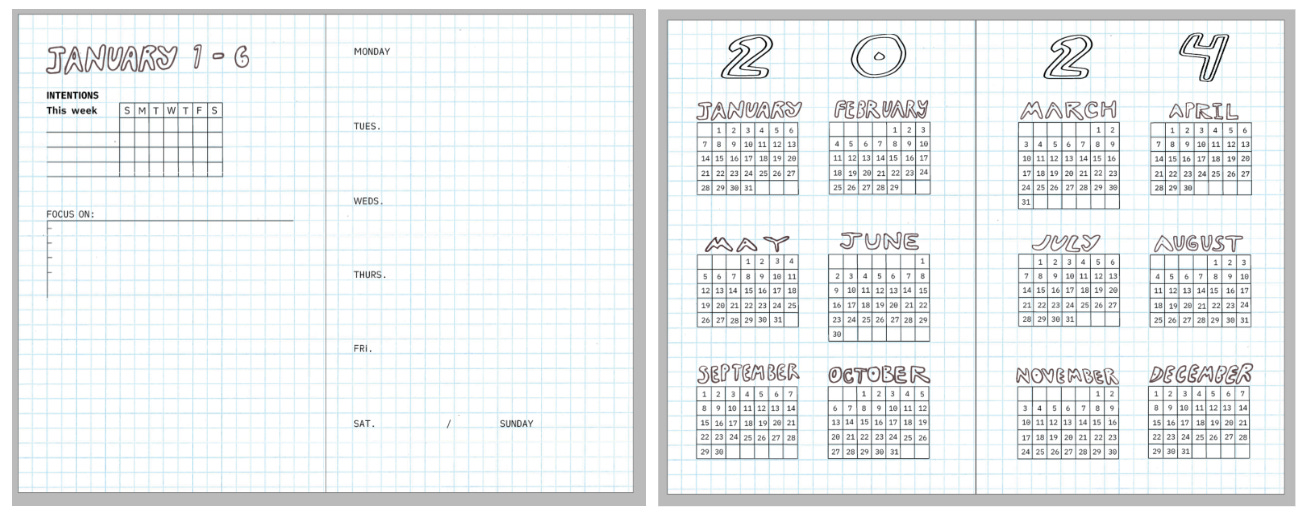It has been a few months since I’ve sent something to your inbox. This fall has definitely been an incubation period for other projects, and I’ve dedicated less attention towards this blog. I never want this space to feel offhand or unintentional — I am careful to not over insert myself when there isn’t anything to say, so a break felt right.
I don’t take your support and subscriptions for granted! Thank you for being here!
Nonetheless, I want to give you a newsletter update of what I’ve been up to the past few months in terms of publishing projects, writing, and books I’ve read. It’s a rather choppy summary, but hopefully concise. I just wanted to let you know I’m still here thinking about things, have some ideas stewing….and Body Buildings is still alive, just resting. <3
This year, I self-published two books. Most recently, the 2024 Calendar Book is a yearly/monthly/weekly planner. It is formatted in the way I organize my time by setting intentions — sort of like pragmatic manifestation. I still have some for sale on my website: noracatlin.com/publishing. Tis the season of giving! 👀 You can check out my other book projects there as well.
On the topic of buying things for the holiday season….
I am also resending an essay I wrote about the cult of consumption through an architectural analysis of The Polar Express. I published this piece on the Substack a few days before Christmas last year, but rereading it now feels relevant:
Pullman and The Polar Express
The uncanny valley is successful in the sense that it tricks our brains into almost believing — into seeing what is right in front of us and wanting to trust it. The architecture of The Polar Express is a warning then as we tip towards the uncanny underbelly of this capitalist season. At whose expense do we believe?
The story of unjust labor and believing in things that we cannot see relates to a recent essay published by Atmos magazine by Venetia La Manna, that is certainly worth sharing: Why Big Fashion’s Black Friday is Harming Us All. During this particular season of encouraged consumption, how can we avoid blind participation in what is quite simply a capitalist scheme?
“When we feel the urge to buy something new, we must pause and consider the labor, craft, time, and energy that went into them. We must learn to value them.”
Related to the topic of feeling emotionally infiltrated by the built environment, I shared an essay last month about the “Smart House” and the way personal assistant technology has begun to change the way we relate to others and ourselves. In case you missed it:
Mother Technology
By giving away all our information, we lose a sense of personal agency, but gain support and a feeling of being known. It’s like being in a relationship: to get closer, you need to be vulnerable, loosening a grip on your own identity to grow with someone else. But what do we lose by giving ourselves to technology?
Last but not least, here is a short list of the fiction books I’ve read recently, in rough order of recommendation:
The Black Prince by Iris Murdoch
“Being is acting. We are tissues and tissues of different personae and yet we are nothing at all. What redeems us is that speech is ultimately divine.”
Matrix by Lauren Groff
The Girls by Emma Cline
All-Night Pharmacy by Ruth Madievsky
Loving Frank by Nancy Horan
Self-Help by Lorrie Moore
The Gospel of Orla by Eoghan Walls
Happy Place by Emily Henry
Big Swiss by Jen Beagin
I Am Homeless If This is Not My Home by Lorrie Moore
Empire Falls by Richard Russo
Big Sur by Jack Kerouac
Pineapple Street by Jenny Jackson
Probably you can tell by now, as a reader of this blog, that I am sensitive, very much informed by the things I ingest. The books I read (and movies I watch) spin my mind into areas unconsidered, like therapy might, providing a new lens onto things I’ve been contemplating, but have difficulty articulating. This fall, I’ve been thinking a lot about the intensity of relationships and connection. How sometimes we think of these things as peripheral to our inner experience, that first there is us then there is them. But you can’t really have an inner experience without being reflected in and through others — the relationships we’re involved in are as much inside of us as our own mind is.
Perhaps there will be an essay about this soon… I’ll make sure you get it.
Also: if you have read any of the books above and are interested in book-clubbing briefly, email me!
Thanks for reading this far, and I hope this disjointed newsletter brings you something new to consider. It is my goal to publish more here in the coming months. As always, please be in touch — send along buildings, or concepts, or books you think I might find interesting.
xo - Nora







